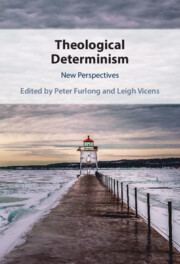Book contents
- Theological Determinism
- Theological Determinism
- Copyright page
- Contents
- Contributors
- Acknowledgments
- Introduction
- Chapter 1 Theological Determinism and Creation
- Chapter 2 Am I Here by Accident?
- Chapter 3 You Searched Me and Knew Me
- Chapter 4 Fatalism and Some Varieties of Contrastive Explanation
- Chapter 5 Divine Transcendence
- Chapter 6 The Incompatibility of Universal, Determinate Divine Action with Human Free Will
- Chapter 7 Natural Compatibilists Should Be Theological Compatibilists
- Chapter 8 An Argument for Theological Incompatibilism
- Chapter 9 Human Freedom and the Inevitability of Sin
- Chapter 10 Hard Theological Determinism and Divine Forgiveness Are Incompatible
- Chapter 11 Moral Luck, Free Will Theodicies, and Theological Determinism
- Chapter 12 Divine Determinism and Gratitude for Sins
- Chapter 13 The Problem of Trust
- Chapter 14 Toward a Reactive Attitudes Theodicy
- Chapter 15 Christ in Gethsemane
- Bibliography
- Index
Chapter 6 - The Incompatibility of Universal, Determinate Divine Action with Human Free Will
Published online by Cambridge University Press: 30 September 2022
- Theological Determinism
- Theological Determinism
- Copyright page
- Contents
- Contributors
- Acknowledgments
- Introduction
- Chapter 1 Theological Determinism and Creation
- Chapter 2 Am I Here by Accident?
- Chapter 3 You Searched Me and Knew Me
- Chapter 4 Fatalism and Some Varieties of Contrastive Explanation
- Chapter 5 Divine Transcendence
- Chapter 6 The Incompatibility of Universal, Determinate Divine Action with Human Free Will
- Chapter 7 Natural Compatibilists Should Be Theological Compatibilists
- Chapter 8 An Argument for Theological Incompatibilism
- Chapter 9 Human Freedom and the Inevitability of Sin
- Chapter 10 Hard Theological Determinism and Divine Forgiveness Are Incompatible
- Chapter 11 Moral Luck, Free Will Theodicies, and Theological Determinism
- Chapter 12 Divine Determinism and Gratitude for Sins
- Chapter 13 The Problem of Trust
- Chapter 14 Toward a Reactive Attitudes Theodicy
- Chapter 15 Christ in Gethsemane
- Bibliography
- Index
Summary
Is it consistent to maintain that human free will is incompatible with determinism in the natural world while also maintaining that it is compatible with divine universal causation? On the face of it, divine universal causation looks like a form of determinism. And the intuitions that lead to incompatibilism about free will and natural determinism also lead to incompatibilism about free will and divine determinism. W. Matthews Grant resists this conclusion. Grant contends that we can understand all of God’s activity as an exercise of divine “libertarian” free will and can construe God’s actions as nothing over and above the (created) effects brought about. I argue that Grant’s attempted reconciliation of human free will and universal divine causation fails, and on two counts. First, Grant’s account of the interaction of divine and created agency is occasionalist; second, even if we assume Grant’s account successfully avoids the charge of occasionalism, it fails to reconcile divine agency with created free agency. The latter is illustrated by exploring the nature of the determination relation required by incompatibilist, agent-causal accounts of free will.
Keywords
Information
- Type
- Chapter
- Information
- Theological DeterminismNew Perspectives, pp. 100 - 118Publisher: Cambridge University PressPrint publication year: 2022
